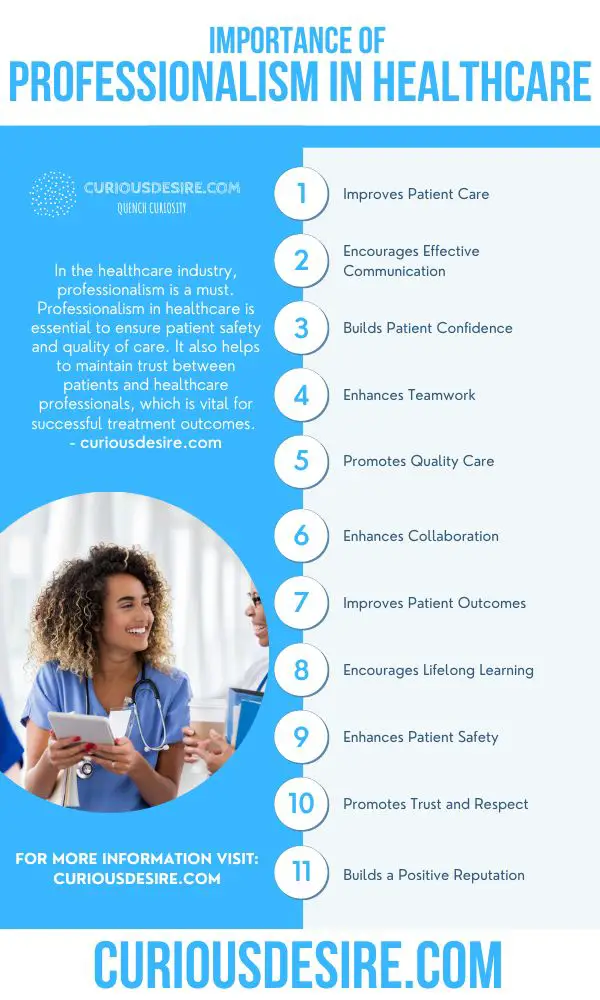In the healthcare industry, professionalism is a must. Professionalism in healthcare is essential to ensure patient safety and quality of care. It also helps to maintain trust between patients and healthcare professionals, which is vital for successful treatment outcomes.
From communication with colleagues to interactions with patients, the importance of professionalism in healthcare cannot be overstated. In this article, we’ll discuss the importance of professionalism in healthcare.
15 Benefits of Professionalism in Healthcare
Professionalism in healthcare gives a number of advantages, including:
1. Professionalism in Healthcare Improves Patient Care
Professionalism in healthcare helps to ensure accurate diagnoses and treatments, which, in turn, leads to better patient outcomes. Through professionalism, healthcare providers look for ways to improve the quality of care and patient safety.
They can also monitor and respond quickly to changes in a patient’s condition, helping them to provide more effective treatments. For instance, nurses can use their professional skills to identify potential problems before they become a bigger issues.

2. It Encourages Effective Communication
Professional healthcare providers understand how important communication is for successful patient outcomes. They speak clearly, listen attentively, and provide relevant information to patients in a respectful manner. This encourages better patient understanding of treatments, medications, and other important health-related issues.
Moreover, healthcare professionals build trust with their patients by responding to their questions and concerns in a timely manner. This builds open communication between the patient and provider and helps to promote quality care.
3. Professionalism in Healthcare Builds Patient Confidence
Patients feel more confident in the care they receive when healthcare providers demonstrate professionalism. When healthcare professionals are courteous, attentive, and respectful, it helps to build patient confidence in the medical team.
Moreover, when healthcare providers maintain a professional demeanour at all times, patients feel that their concerns are being taken seriously and handled with respect which can lead to better patient outcomes.
4. Professionalism in Healthcare Enhances Teamwork
When healthcare providers maintain a professional attitude, they create an environment that encourages collaboration and teamwork. This helps to ensure that the patient receives the best possible care by having all members of the medical team working together towards a common goal.
It also helps to reduce conflicts between healthcare professionals which can lead to better patient care. With effective teamwork, healthcare providers have a better understanding of each other and can communicate more effectively.
5. Professionalism in Healthcare Promotes Quality Care
When healthcare professionals demonstrate professionalism, they are more likely to provide quality care. Professionalism encourages healthcare providers to stay up-to-date on the latest advancements in healthcare and to use evidence-based practices when providing care.
It also helps healthcare providers to adhere to the standards of practice set by their profession and to stay within ethical boundaries. This ensures that patients are receiving high-quality, safe care while building trust between patient and provider.
Suggested Readings
Why professionalism is important?
Importance of professionalism in business
6. Professionalism in Healthcare Enhances Collaboration
Healthcare professionals who demonstrate professionalism are more likely to collaborate with other healthcare providers. This can help to create an environment where care is provided in a timely, effective manner and helps to reduce the duplication of services.
It also encourages open communication between all members of the medical team, which can lead to better patient outcomes. Furthermore, when healthcare providers collaborate, they are able to share best practices and identify potential problems early, which can help to reduce medical errors.

7. Professionalism in Healthcare Improves Patient Outcomes
When healthcare professionals demonstrate professionalism, it helps to ensure that patients receive the best quality of care possible. This can lead to better patient outcomes, such as improved health and well-being, faster recovery times, and better disease management.
Moreover, when healthcare professionals provide quality care in a professional manner, it helps to build trust between patient and provider, which can lead to improved patient satisfaction.
8. Professionalism in Healthcare Encourages Lifelong Learning
When healthcare professionals maintain a professional attitude, they are more likely to engage in lifelong learning. This helps healthcare providers to stay up-to-date on the latest advancements in healthcare and to use evidence-based practices when providing care.
It also helps healthcare providers to identify their own areas for improvement and gain new knowledge and skills, which can lead to better patient care. Professionalism encourages healthcare providers to continuously strive for excellence in the care they provide.
9. Professionalism in Healthcare Enhances Patient Safety
When healthcare professionals maintain a professional attitude, they are more likely to adhere to the standards of practice set by their profession and stay within ethical boundaries. This helps to ensure that patients receive safe care while building trust between patients and providers.
It also encourages open communication, which can help to identify potential problems early and reduce medical errors. Through professionalism in healthcare, providers can help to ensure that patients receive the highest quality of care possible.
10. Professionalism in Healthcare Promotes Trust and Respect
When healthcare professionals demonstrate a professional attitude, they are more likely to be respected by their peers and the patients they serve. This helps to build trust between patient and provider, which can lead to improved patient outcomes as well as satisfaction with the care provided.
Furthermore, by showing professionalism, healthcare providers can help to ensure that all parties involved in the care process are treated with respect and dignity.

11. It Builds a Positive Reputation
When healthcare providers demonstrate professionalism, it helps to create a positive reputation for their practice or organization. This can lead to an increase in patient referrals and help build the organization’s reputation as a leader in healthcare services.
By creating an environment that values professionalism, healthcare organizations can ensure they provide the highest quality of care possible. It can also help to create a positive work environment for healthcare providers, which can lead to greater job satisfaction and improved patient outcomes.
12. It Improves the Patient Experience
When healthcare professionals maintain a professional attitude, it helps to create an atmosphere of trust and respect, which can improve the patient experience. This can lead to greater satisfaction with the care they receive and improved patient outcomes.
Professionalism in healthcare also encourages providers to practice evidence-based medicine which can help patients make informed decisions about their treatment.
13. Professionalism Imparts a Sense of Duty and Commitment
When healthcare professionals demonstrate a professional attitude, it conveys a sense of duty and commitment to their patients. This helps to improve patient trust in their providers, which can lead to better adherence to treatment plans and improved outcomes for their patients.
It also serves as an example for other healthcare providers on how they should interact with their patients. By demonstrating professionalism, healthcare professionals can ensure that they are treating their patients with the respect and care they deserve.

14. Professionalism in Healthcare Benefits Everyone Involved
When healthcare professionals demonstrate professional behaviours, it benefits everyone involved in the care process. It helps to create an environment of trust, respect, and communication which can lead to improved patient outcomes.
It also promotes open dialogue between healthcare providers and patients, which can help identify potential problems early on. By ensuring that all parties involved are treated with the utmost respect and care, professionalism in healthcare can help create a safe and effective system of care.
Suggested Readings
importance of professionalism in teaching
Importance of professionalism in the workplace
Importance of professionalism essay
15. Professionalism in Healthcare is Essential
Professionalism in healthcare is essential for providing the best care possible to patients. It helps to ensure that everyone involved in the care process is treated with respect and dignity, which can lead to improved patient outcomes and satisfaction with the care provided.
Furthermore, it conveys a sense of duty and commitment to their patients, which helps to build trust between patient and provider. By demonstrating professionalism, healthcare providers can help create a positive environment and ensure that their patients receive the highest quality of care possible.
Conclusion
No matter what type of healthcare setting you are in, professionalism is always essential. Healthcare professionals should strive to demonstrate a professional attitude in all aspects of their work in order to ensure that their patients receive the best care possible.
The importance of professionalism in healthcare cannot be overstated, as it is essential for providing quality care and improving patient outcomes. Healthcare providers should strive to demonstrate professional behaviour at all times in order to create a safe and effective system of care.
By maintaining a professional attitude, healthcare organizations can ensure that their patients receive the best care possible.
What do you think about the importance of professionalism in healthcare? Share your thoughts in the comments below.
Relevant Articles
Why professionalism is important?
Importance of professionalism in business
Importance of professionalism in teaching